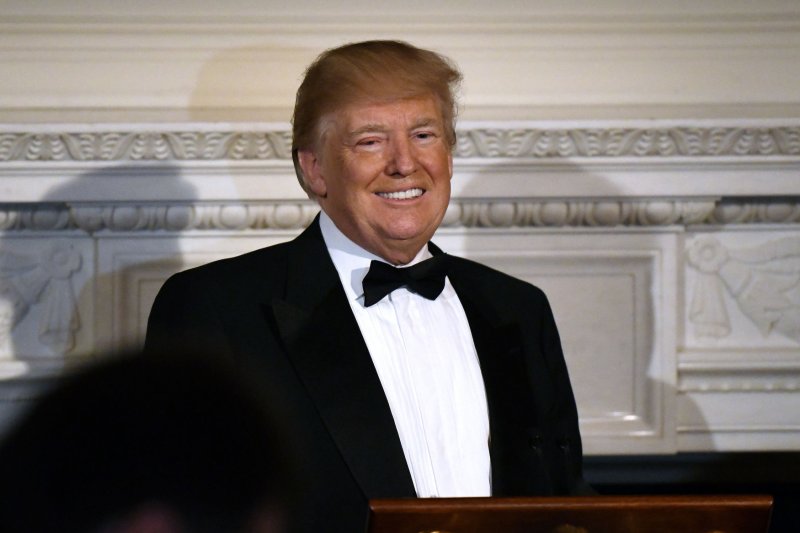President Donald Trump smiles before speaking at the Governors' Ball in the State Dinning Room of the White House on Sunday. Photo by Olivier Douliery/UPI |
License Photo
The presidential oath of office requires each chief executive to swear or to affirm that I will "to the best of my ability, preserve, protect and defend the Constitution of the United States." Since taking this oath over 400 days ago, no president has been confronted with so many calls for impeachment as has Donald Trump. But the Constitution specifies impeachment and conviction can only occur for "high crimes and misdemeanors." Character, temperament, fitness for office or boorish behavior do not necessarily fall under that category. Nor do lack of common sense, judgment and competence.
The matter of preserving, protecting and defending the Constitution do, however, meet that impeachment threshold. In this instance, the question of whether the president is upholding this oath regarding Russia may not be trivial. On the other hand, the president may have good reason for his actions toward Russia. Unfortunately, he has not revealed them yet.
If Congress were to vote on whether Russia was a threat or an enemy, there probably would be fewer dissents than the two senators who opposed the 1964 Tonkin Gulf Resolution that led us into the Vietnam War. That the heads of all of America's intelligence agencies could unanimously agree that Russia had actively interfered in past elections and would do so again in 2018 and 2020 unless stopped, is further hard evidence of Moscow's policies. And National Security Adviser H.R. McMaster reaffirmed Russia's interference in a major address to the Munich Security Conference drawing a rebuke from the president reminding all "there was no collusion."
Further, the president's national security strategy and national defense strategy cite Russia as a "revisionist" power. One of the Department of Defense's priorities is to deter "and if necessary defeat Russia" if war were to come. Those are strong words and are not suggestive of a friendly or even only just a competitive relationship.
Special counsel Robert Mueller's indictments of 13 Russian citizens and three Russian organizations for violating U.S. law and interfering in American politics is both highly detailed and unarguable. Still, the president does not accept these findings, even though he asserts that he has been tougher on Russia than his predecessor Barack Obama. The question remains why the president refuses to explain what his views about Russia really are.
Suppose that the president has good reason to be coy about Russia and Vladimir Putin. Let us further assume there is no compromising material Russia has on the president and, as he asserts, that he is innocent of collusion or any other seemingly illegal relationship -- although it will take the special counsel to support or to refute the president's claims. What could be motivating him?
Let us assume that Trump (grudgingly?) respects Putin and his ability to attract and maintain strong support at home. Further, let us assume that while the president must understand Europe's condemnation and backlash to Russia's annexation of Crimea and military intervention into Eastern Ukraine in 2014, that was none of his doing and not on his watch. It was the fault of Obama and Trumpian nemesis Secretary of State Hillary Clinton and their inaction for which he bears no responsibility.
Finally, both Russia and America have common interests in defeating Islamist terror and promoting stability in the Middle East. And if NATO members in Europe are not prepared to pay their fair share for defense, why should the United States be permanently entangled in a hopeless alliance? That perhaps is one reason why the president was so reluctant to acknowledge Article 5 of the NATO treaty declaring an attack against one an attack against all.
A deal can be made with Russia. However, that deal must await Russian elections on March 18 that will return Putin no doubt with a large and perhaps overwhelming majority. And it must await the conclusion of the Mueller investigation to clear the president and allow him to move forward with a Russian initiative.
Would anyone believe that line of reasoning? Politely put, the answer is probably not. Thus, other potentially nefarious factors may be the underlying reason for the president's de facto or at least understated criticism of Russia and the failure to heed the overwhelming advice he is getting to protect the nation from Moscow's certain political interference.
Absent a statement as to his assessment of the Russian threat and a continued reluctance to take action, is the president preserving, protecting and defending the Constitution to the best of his ability? If the answer is no, does this failure rise to a high crime or misdemeanor? And will it?
Harlan Ullman served as senior adviser for Supreme Allied Commander Europe for 12 years, is senior adviser at Washington D.C.'s Atlantic Council and chairman of two private companies. His newest book is "Anatomy of Failure: Why America Has Lost Every War It Starts." Follow him on Twitter@harlankullman.















